Harold Ramis: Anatomy of a Comedian
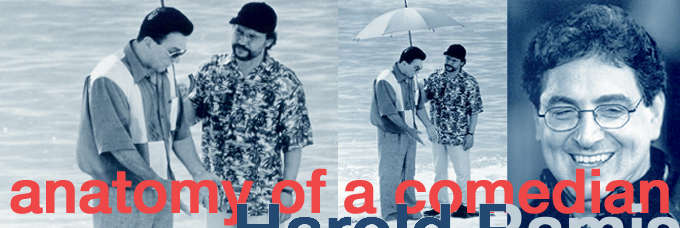
With most people the name Harold Ramis probably doesn’t ring a bell instantaneously, but if you ask them to go back a few years to a movie called “Ghostbusters”, most start to remember. Harold Ramis was playing Dr. Egon Spengler in Ivan Reitman’s outrageous action comedy and its sequel, and although he has slowly left the spotlight of acting since then, these days Ramis acts as a successful writer and more importantly as an acclaimed director. Films like “Multiplicity”, “Groundhog Day”, “Caddyshack”, “National Lampoon’s Vacation” and many others carry Ramis’ signature and many of the projects he was involved in have literally become popular culture since.
His latest movie “Analyze This” has wowed audiences and critics alike and when we hooked up with the director for this interview, he was actually busy coordinating efforts for a home video release of this particular film through Warner Home Video, including a DVD version. Despite his success Harold Ramis is still a true comedy lover who is very affectionate about the genre, and “Analyze This” is just another example for his talents.
Starting out as an actor in the TV series “Second City TV” in the 70s, Ramis went on to become an acclaimed screenwriter before he finally started directing his first film, “Caddyshack” in 1980. This progression gives Ramis a lot of insight into the needs of these different professions in order to get the best results on celluloid and it inevitably begs the question, which of the professions he personally enjoys the most.
“Directing is the most challenging because it uses everything you know,” he says without deliberation. “About life, philosophy, psychology, all these things. The range of decisions you have to make as a director is so interesting and wide. From the look of the wallpaper all the way to cinematic decisions, it all has to be done and it is extremely challenging.?
Acting has become more of a hobby of mine and I don’t really look for acting work.” However, people call the director up occasionally to ask whether he would like to appear in certain films. “I like it that way,” he says with a smirk. “People call me up when they want to cast me in a small part. I hate going through auditions.”
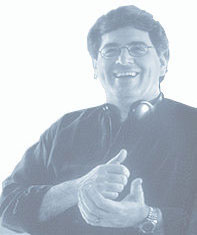 No matter whether he acts, writes or directs a film, one common denominator is always persistent. All his films are comedies, the hardest genre a filmmaker could possibly be in. It is one of the few genres that constantly evolves as people’s tastes and sensibilities change, and cultural events shape our environments. It is also one of the hardest genres as the delivery and the right technique is nothing you can learn by the book. While comedies are obviously his personal preference, Ramis is also eyeing other genres. “There are other things in development in my production company,” he explains. “As a producer I’m very interested in doing other kinds. As a writer it just never happened. Maybe some time.”
No matter whether he acts, writes or directs a film, one common denominator is always persistent. All his films are comedies, the hardest genre a filmmaker could possibly be in. It is one of the few genres that constantly evolves as people’s tastes and sensibilities change, and cultural events shape our environments. It is also one of the hardest genres as the delivery and the right technique is nothing you can learn by the book. While comedies are obviously his personal preference, Ramis is also eyeing other genres. “There are other things in development in my production company,” he explains. “As a producer I’m very interested in doing other kinds. As a writer it just never happened. Maybe some time.”
Never second-guess the audience and dumben them out
?Harold Ramis on “Analyze This”
Interestingly all the films Ramis has been associated with have been hits around the world. While traditionally some movies have a tendency to relate well to US audiences, Ramis’ films always hit the right string with a variety of cultures. It is not just a matter of finding the right taste, but also of finding the right people to work with.
“Part of it is working with people you respect and who have talent,” Ramis confides. “Analyze This is a perfect example. My main actors were both directors, which made it very easy for me to work with them, because they know how to make it work.” This is without a doubt one of the most important aspects when creating a comedy because the subtle delivery of a line of dialogue can make all the difference, just as a subtle gesture or change in pose can.”
“We also have a motto, which is, always work from the top of your intelligence. Never second-guess the audience and dumben them out. When I started I did a lot of broad comedy, but there’s a big difference between broad and stupid comedy,” the director explains. “I also always try to maintain some philosophical and moral ambition in my films. There always needs to be something to be learned from it.”
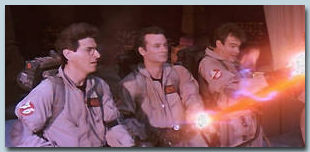
Ramis as a Ghostbuster
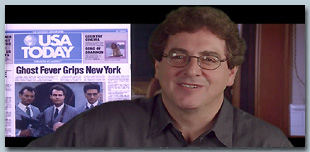
Ramis about the Ghostbusters
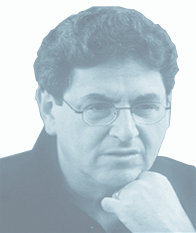
There is this auteur feel around directors these days
?Harold Ramis on “Analyze This”
Harold Ramis is one of those directors who do not care too much about technical issues in general and have everything in their heads when they go to the set. “It’s all in my head. It’s funny because when friends visit me on the set, they usually notice that there’s no paper around anywhere. Not even the script,” he explains.
Since he is also writing most of the films he is directing, it is only natural that every little detail is in his head and he doesn’t need much paper to explain his ideas and visions to a director or writer respectively. Going through various stages of script development with all the rewrites involved by the time he starts shooting his films, Ramis is very well acquainted with the material. He also points out that as a writer you have already done all the work of the director in your head, pre-visualizing every scene. But still it takes a solid crew of people to bring this vision to fruition. “When I get on the set I get so much support from the people involved. There’s the Director of Photography who helps a lot, there are great production and set designers who take up the slack. Usually I just sit back, let them do their work and let people bring questions to me as they arise. It’s a very collaborative process. I’m no expert in the technical aspects of filmmaking so I don’t even try to interfere with their expertise.”Although there seems to be a tendency in Hollywood that the director is supposed to know everything, Ramis has learned early on that sometimes it is just as important to be able to say “I don’t know!” at times. “There is this auteur feel around directors these days, the impression the director needs to know everything, which I think is not true.”
No pre-visualization can account for proper preparation when it comes to hard-hitting action scenes however and Ramis agrees that preparation is indeed required there. “The action scenes in my films are usually fully storyboarded, shot by shot. It’s just too dangerous not to and I don’t want to take any chances.”?Most of the time Ramis is shooting much more material than he ultimately needs for his final film. Mostly in order to be able to use the extra footage to fill in the narrative and to be able to tighten the story at the editing stage where the film is magically coming to life.
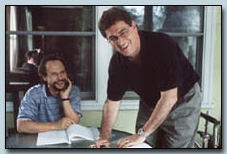 Asked how he feels about home video in general and the adaption of films to the small screen, Ramis, a DVD owner himself, feels that video in general hasn’t really changed filmmaking but rather changed the expectations. “If a movie doesn’t get seen so much in theaters and doesn’t do too well at the box office, it always has a life on video. In the old days when I was a kid, if you missed movie, you missed it. There was no Blockbuster where you could rent it and watch it over and over again. Video contributes a lot to the life of a film.”
Asked how he feels about home video in general and the adaption of films to the small screen, Ramis, a DVD owner himself, feels that video in general hasn’t really changed filmmaking but rather changed the expectations. “If a movie doesn’t get seen so much in theaters and doesn’t do too well at the box office, it always has a life on video. In the old days when I was a kid, if you missed movie, you missed it. There was no Blockbuster where you could rent it and watch it over and over again. Video contributes a lot to the life of a film.”
“When TV proliferated our households, the industry wanted to kill it. They were afraid it would kill movie theaters, and it didn’t. Every time a new medium came around, the industry panicked. When video showed up, again they thought it would kill movie theaters, and it didn’t. Now the industry adapted to it and today we have day & date releases and it doesn’t hurt the theatrical runs of movies at all. Movies are a great social experience and nothing can replace the feeling of being in a movie theater with others.”
“Analyze This” has so far been Harold Ramis’ most successful film – at least from a monetary standpoint – and it is the film he is most proud of at this point, but he is also very fond of his previous film “Groundhog Day”. Observing that sometimes the work he is the most satisfied with is not necessarily the most successful one, he mentions that it is in part because viewers just don’t have the chance to notice all the details that were put into the film and that were important to the filmmakers.
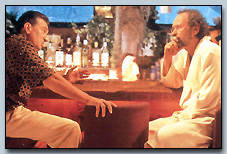
Robert DeNiro and Billy Crystal in
“Analyze This”
“I came on board of Analyze This as the 5th writer and the cast was already there,” Ramis remembers and agrees that audiences would certainly expect Danny Aiello or Dennis Farina in these parts. This twist made the project even more interesting for him. “The ideas for Analyze This were developed at Tribeca, with Robert DeNiro in mind and it traveled from there. Usually you start out with a dream cast in your imagination. In this case when I was handed the project, it already had a dream cast.”
“Analyze This” started its life as a spec script by playwright Kenneth Lonergan and quickly found its way into Billy Crystal’s hands who hired Peter Tolan to do another draft. As he read it, Crystal immediately saw Robert DeNiro in the part of Paul Vitti and approached Tribeca Productions so that DeNiro and his partner Jane Rosenthal could take a look at it. From there things just started rolling. Although slightly concerned whether he should really parody himself, Robert DeNiro took the chance because he was very intrigued by the concept. Making sure not to turn the film into a flat parody however, he approached the project with the same integrity with which he approaches everything. He insisted that the film accurately and authentically reflect the world of the character he was going to portray, which was in complete accord with Billy Crystal’s vision of the film. To bring in Harold Ramis as the film’s director was easy, as he turned out to be everyone’s first choice. But Ramis was not exactly happy to go to New York to shoot the film after having relocated from Los Angeles to Chicago shortly before.
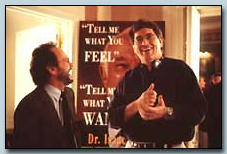
On the set of “Analyze This”
“But when my agent called me a few months later and asked me how I would feel about the project of Billy Crystal and Robert DeNiro were involved, it definitely became something I wanted to do,” he adds with a smirk.
“I felt a lot of respect when I heard that Bob [DeNiro] was attached. I’m an existentialist and take things as they come, rather then getting anxious and respond to that, “ the director joyfully remarks. “Will Bob like me, will they think I’m funny enough, will they respect me as a director, of course these questions flipped through my mind, but I simply turned that noise off. My first meeting was with Bob alone in a restaurant and he was very down to earth, enthusiastic and immediately responded to my ideas. This meeting took away a lot of the anxiety.”
“I was much more anxious to please Billy Crystal to make sure it’s as funny as he wants it, that it has the right balance he wants, things like that. After all, Billy had been developing the project longer than anyone else.”
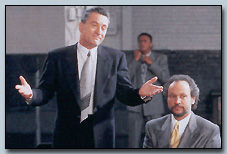
A comedy can still say something meaningful!
?Harold Ramis on “Analyze This”
With this strong a cast Ramis believed that the film’s content could take on an extra dimension. “I would never do a movie that trivializes violence,” he remarks.
“I thought this movie could be done only if everything was played for real, if things had real impact, if you didn’t allow the audience to weasel out of any responsibility by saying ‘it’s fun, a romp.’ So my first step was to sit down with Billy and Bob to discuss the approach.”
The three of them figured out that the root cause of Vitti’s problems should be fear, grief, range and guilt, and they agreed upon the fact that they wanted to show that the cycle of violence can indeed be broken. “Yes, the film is a comedy,” Ramis points out, “and we were never going to lose sight of that. But a comedy can still say something meaningful.”
With “Analyze This” completely wrapped for a home video release, Harold Ramis is now turning his attention towards several new projects and a big rewrite of one of his 20th Century Fox projects, but can’t tell any of the details. When “Analyze This” will hit DVD later this month, I am sure many people will agree with his vision and that of Billy Crystal and Robert DeNiro. The film turned out to be an incredibly intelligent comedy and a highly successful one. If Harold Ramis the actor is best known for his part in the “Ghostbusters” movies, Harold Ramis the director will certainly be best known from now on for his achievement on “Analyze This”.







Leave a comment
You must be logged in to post a comment.